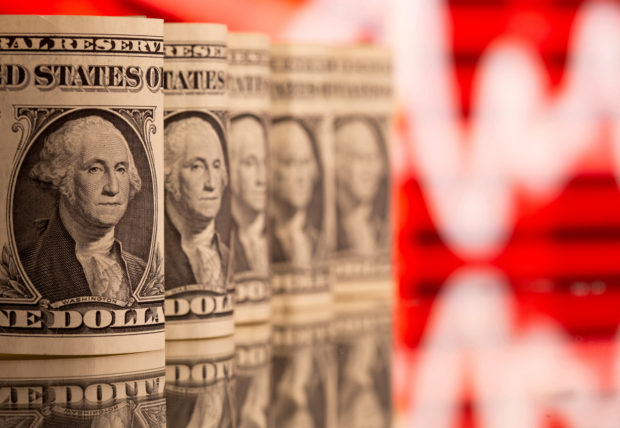Bond bear market? ‘Worst year in history’ for asset as inflation bites

U.S. One dollar banknotes are seen in front of displayed stock graph in this illustration. REUTERS/Dado Ruvic/Illustration/File photo
NEW YORK – An accelerating decline in bond markets is bringing fresh pain for fixed income investors in a year when global bonds have already lost a fifth of their value.
Yields on U.S. government bonds have surged since Fed Chairman Jerome Powell sent an unambiguously hawkish message to markets during August’s Jackson Hole symposium, with the ICE BoFA U.S. Treasury Index on track for its worst annual performance on record.
Bonds in many European countries, meanwhile, marked their worst monthly performance in decades in August, helping send the closely watched Bloomberg Global Aggregate Bond Index down about 20 percent from its peak for the first time ever.
“This is the worst year in history by far for fixed income,” said Lawrence Gillum, fixed income strategist for LPL Financial. “If that’s not a bear market in bonds I don’t know what is.”
The devastating sell-off in bonds had seen yields on the benchmark 10-year Treasury, which move inversely to prices, hit an 11-year high in June, rally along with stocks over the summer only to sell off again, sparking fears that new lows may be coming.
While declines of more than 20 percent are typically called bear markets when they hit stocks, they are virtually unknown in bonds, an asset class that emphasizes stability and reliable returns. From 1990 to its peak in January 2021 – a period spanning much of a generation-long bull market in bonds – the global index had delivered an aggregate total return of nearly 470 percent.
Many investors are betting the weakness in bonds will continue as central banks tighten monetary policy to bring down inflation in the United States and across the world.
Investors broadly expect the Fed to raise rates by 75 basis points later this month, and some believe an equally large hike could be in store from the European Central Bank next week. A U.S. jobs report on Friday is also being closely watched by investors.
Net bearish positioning among hedge funds and other speculative investors is up 30 percent since the end of July, according to Commodity Futures Trading Commission data.
Gregory Whiteley, a portfolio manager at DoubleLine, believes U.S. inflation, which showed signs of ebbing in the latest consumer prices report, will likely persist, taking two-year yields to 4%. Longer-dated Treasuries, however, may be nearing a bottom, he said.
The Bloomberg U.S. Aggregate Bond Index is down 12.5 percent from its highs, more than double any previous peak-to-trough decline going back to the 1970s.
Simeon Hyman, head of investment strategy at ProShares, has focused on higher quality corporate credit and is underweight longer-dated Treasuries.
Hyman believes additional pressure on bonds could come as the Fed reduces its balance sheet, a process known as quantitative tightening that hits its full stride in September as the central bank trims $95 billion a month from its holdings.
“When you take the little bit more hawkish tone from the chair and put that together with the doubling of size of quantitative tightening, you have to say to yourself ‘there’s more room for interest rates to rise,'” he said.
Some investors think the recent sell-off is a time to buy bonds on the cheap, a bet that partially hinges on the Fed slowing its policy tightening once it sees the U.S. economy beginning to weaken.
Gene Tannuzzo, global head of fixed income at Columbia Threadneedle Investments, is betting declines in the housing market and weaker car sales are the first signs that the Fed’s rate hikes are filtering through the economy. He is favoring high-grade corporate bonds and mortgage-backed securities.
Anders Persson, chief investment officer for global fixed income at Nuveen, is adding to Treasury positions, betting that yields are unlikely to go much higher.
“Treasury markets have done a quite good job of pricing in that we won’t see a Fed pivot anytime soon.”